
Vladimir Fyodorovich Promyslov (Russian : Владимир Фёдорович Промыслов; 28 August 1908 – 22 May 1993) was a Soviet politician. He served as the Mayor of Moscow between 1963 and 1986 and was succeeded by Valery Saikin.

Vladimir Fyodorovich Promyslov (Russian : Владимир Фёдорович Промыслов; 28 August 1908 – 22 May 1993) was a Soviet politician. He served as the Mayor of Moscow between 1963 and 1986 and was succeeded by Valery Saikin.
Promyslov was born in Kabuzhskoye, Kolomensky Uyezd.
A professional builder, Promyslov graduated from Moscow Construction Engineering Institute, and was appointed head of the Moscow construction department by Nikita Khrushchev. In 1963 he was appointed chairman of the Moscow Executive Committee, a position equivalent to that of Mayor. During his term the Ostankino Tower, the Rossiya Hotel, and dozens of new subway stations were built. In 1980 Moscow hosted the 1980 Summer Olympics, and several sport venues were constructed for it, among them the Luzhniki Stadium and the Olympic Stadium.
Promyslov also oversaw the completion of the administrative subdivisions reform, which divided Moscow into 20 raions. This reform is now considered unsuccessful and was reverted during the 1990s.
He died in Moscow, and was buried at the Troyekurovskoye Cemetery.

The 1976 Summer Olympics, officially known as the Games of the XXI Olympiad and officially branded as Montreal 1976, were an international multi-sport event held from July 17 to August 1, 1976, in Montreal, Quebec, Canada. Montreal was awarded the rights to the 1976 Games at the 69th IOC Session in Amsterdam on May 12, 1970, over the bids of Moscow and Los Angeles. It was the first and, so far, only Summer Olympic Games to be held in Canada. Toronto hosted the 1976 Summer Paralympics the same year as the Montreal Olympics, which still remains the only Summer Paralympics to be held in Canada. Calgary and Vancouver later hosted the Winter Olympic Games in 1988 and 2010, respectively. This was the first of two consecutive Olympic games held in North America, followed by the 1980 Winter Olympics in Lake Placid.
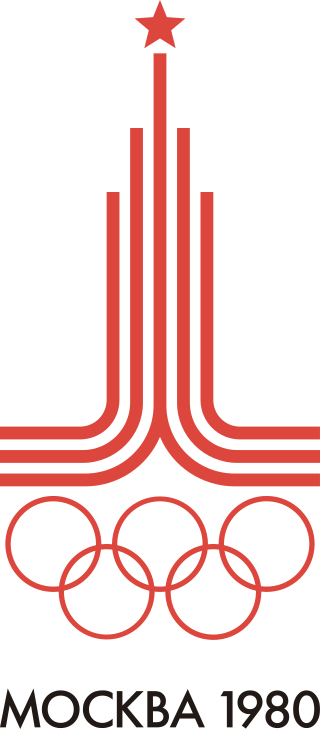
The 1980 Summer Olympics, officially known as the Games of the XXII Olympiad and officially branded as Moscow 1980, were an international multi-sport event held from 19 July to 3 August 1980 in Moscow, Soviet Union, in present-day Russia. The games were the first to be staged in an Eastern Bloc country, as well as the first Olympic Games and only Summer Olympics to be held in a Slavic language-speaking country. They were also the only Summer Olympic Games to be held in a self-proclaimed communist country until the 2008 Summer Olympics held in China. These were the final Olympic Games under the IOC Presidency of Michael Morris, 3rd Baron Killanin before he was succeeded by Juan Antonio Samaranch, a Spaniard, shortly afterward.

The Grand Sports Arena of the Luzhniki Olympic Complex, commonly known as Luzhniki Stadium, is the national stadium of Russia, located in its capital city, Moscow. Its total seating capacity of 78,011 makes it the largest football stadium in Russia and the ninth-largest stadium in Europe. The stadium is a part of the Luzhniki Olympic Complex, and is located in Khamovniki District of the Central Administrative Okrug of Moscow city. The name Luzhniki derives from the flood meadows in the bend of Moskva River where the stadium was built, translating roughly as "The Meadows". The stadium is located at Luzhniki Street, 24, Moscow.

Misha, also known as Mishka or The Olympic Mishka, is the name of the Russian Bear mascot of the 1980 Moscow Olympic Games. He was designed by children's books illustrator Victor Chizhikov.
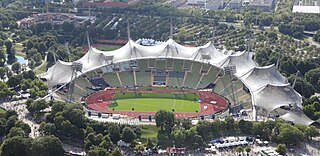
Olympiastadion is a stadium located in Munich, Germany. Situated at the heart of the Olympiapark München in northern Munich, the stadium was built as the main venue for the 1972 Summer Olympics.
The football tournament at the 1980 Summer Olympics started on 20 July and ended on 2 August. Only one event, the men's tournament, was contested. Seven qualified countries did not participate, joining the American-led boycott in protest of the December 1979 Soviet invasion of Afghanistan.

The 1980 Summer Olympics boycott was the largest boycott in Olympic history and one part of a number of actions initiated by the United States to protest against the Soviet invasion of Afghanistan. The Soviet Union, which hosted the 1980 Summer Olympics in Moscow, and its satellite states later boycotted the 1984 Summer Olympics in Los Angeles.

The SM Kirov Stadium was a multi-purpose stadium in St. Petersburg, Russia, and was one of the largest stadiums anywhere in the world. The stadium was named after Sergey Kirov.

Central Dynamo Stadium was a stadium in Moscow, Russia. It was built in 1928 and held 36,540 people. It was the home ground for Dynamo Moscow. It was central venue of the All-Soviet Dynamo sports society and carried special name of Central to denote its importance. Until the construction of the Central Lenin Stadium in 1956, the Central Dynamo Stadium was the central sports facility in Moscow. The stadium was one of the venues of the football tournament of the 1980 Summer Olympics.

Olympic Stadium was an indoor arena located in Moscow, Russia. It was built for the 1980 Summer Olympics and, divided into two separated halls, hosted the basketball and boxing events. It was closed in March 2019, and was subsequently demolished in 2020 for the construction of a new complex.

The 1998 World Youth Games was the first international multi-sport event of its kind. More than 7,500 young athletes representing 140 countries of the world participated in this event. The Games took place in Moscow, Russia from July 11 to 19, 1998.

The Olympic Aquatics Stadium was a temporary aquatics center in the Barra Olympic Park in Rio de Janeiro. The venue hosted the swimming events, Synchronized swimming finals and water polo finals at the 2016 Summer Olympics, and the para-swimming events for the 2016 Summer Paralympics.
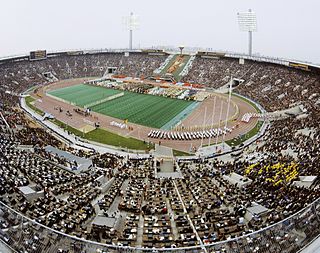
The Opening Ceremony of the 1980 Summer Olympics was the official opening ceremony held in the afternoon at 16:00 Moscow Time (UTC+3) on 19 July 1980 in the Grand Arena of the Central Lenin Stadium. It was attended by the Chairman of the Presidium of the Supreme Soviet of the USSR, Leonid Brezhnev, and IOC President Lord Killanin.

The Closing Ceremony of the 1980 Summer Olympics was held at 19:00 Moscow Time (UTC+3) on 3 August 1980 at the Grand Arena of the Central Lenin Stadium. It was attended by the Chairman of the Presidium of the Supreme Soviet of the USSR, Leonid Brezhnev. IOC President Lord Killanin closed the Games for the final time and passed the position on to Juan Antonio Samaranch.

The Trade Unions' Equestrian Complex is an equestrian venue located near Bitsa Park in the South District of Moscow city, Russia. During the 1980 Summer Olympics, it hosted the riding and running portions of the modern pentathlon events and all of the equestrian events except individual jumping, which was held at the main venue, Grand Arena of the Central Lenin Stadium.
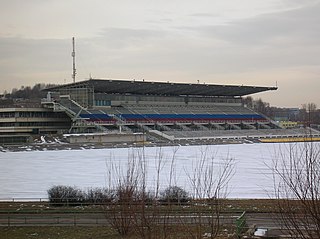
For the 1980 Summer Olympics, a total of twenty-eight sports venues were used. The first venue used for the Games was built in 1923. With the creation of the Spartakiad in Moscow in 1928, more venues were constructed. Central Lenin Stadium Grand Arena was built in 1956 for that year's versions of the Spartkiad. A plan in 1971 to construct more sports venues by 1990 was initiated, but accelerated in 1974 when Moscow was awarded the 1980 Games. The new venues to be used for the Games were completed in 1979. During the Games themselves at the permanent road cycling venue, the first ever constructed, the largest margin of victory was recorded in the individual road race cycling event since 1928. The Grand Arena hosted the football final that was played in a rainstorm for the third straight Olympics. After the 1991 break of the Soviet Union, the venues in Kiev, Minsk, and Tallinn would be located in Ukraine, Belarus, and Estonia, respectively. Luzhniki Stadium, formerly Grand Arena, continues to be used, and it was affected by the Luzhniki disaster in 1982. The stadium served as host for the IAAF World Championships in Athletics in 2013. Another venue, the Moscow Canoeing and Rowing Basin, served as host to the ICF Canoe Sprint World Championships in 2014. In December 2010, Russia was awarded the 2018 FIFA World Cup with Luzhniki Stadium and Dynamo Stadium proposed as venues for those events.

The Soviet Union Olympic football team was the national Olympic football team of the Soviet Union from 1952 to 1992. The team participated in all of the qualification football tournaments for Summer Olympics. Until 1992, when age restrictions were officially introduced, the Soviet Union used the first team both in qualification tournaments and finals except for 1960 and 1964 when the second national team was used for the qualification tournaments.
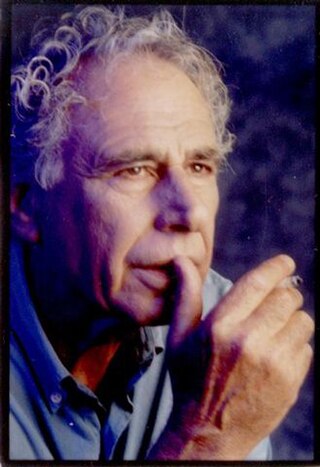
Israel Meir Goodovitch is an Israeli architect and urban designer, known mostly as the former City Engineer of Tel Aviv-Yafo.

From 1990 to 2022, the American fast food chain McDonald's operated and franchised McDonald's restaurants in Russia.